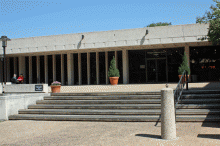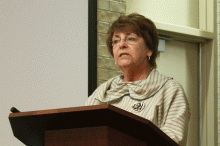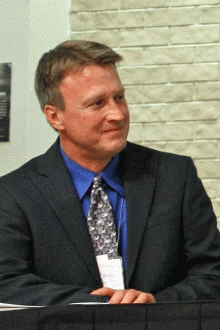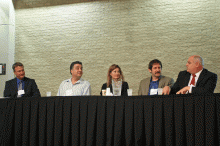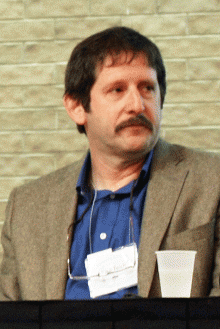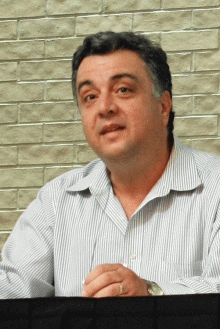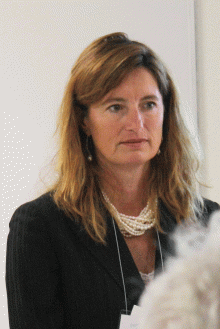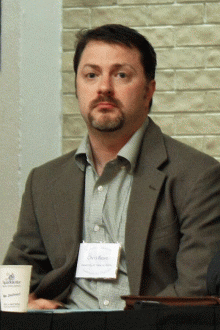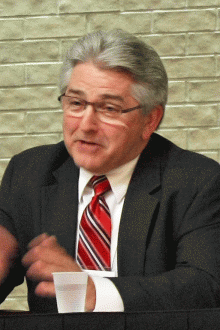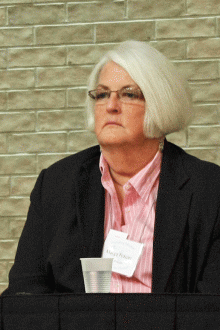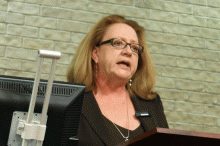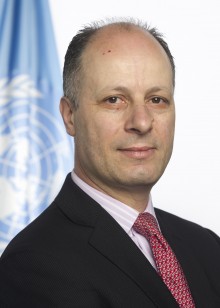2012 Austin
Promoting Tolerance: Solutions for Change
Joe B. Thompson Center, University of Texas at Austin
Saturday, September 22, 2012
WELCOME
Dr. Rosemary Morrow welcomed everyone and introduced her Co-Chair, Anne-Marie Carlson, the Chair of CTAUN in New York City.
Mrs. Carlson stated that CTAUN has been holding conferences for educators since 1999, focusing on global issues and issues of concern, along with highlighting successful international and local projects , and the group is now in the midst of planning the 14th conference to be held at United Nations Headquarters in New York on 18 January 2013. She noted that this was CTAUN’s second conference in Austin and it was being held in conjunction with several groups: Delta Kappa Gamma, The University of Texas at Austin, AAUW, Rotary International, UN USA, Global Austin, and the Austin Independent School District (AISD). She stated that the theme of promoting greater tolerance is most appropriate to the world scene today.
Assistant Dean Dr. Richard Flores, College of Liberal Arts, UT at Austin, thanked the Steering Committee, extended a welcome to Austin, and called the theme “exciting, engaging, and critical since we must find a common ground to work in our neighborhoods and around the globe.” He recalled his recent trip to Tunis where he felt there was a sense of hope and expectation in both school and business leaders who realize that getting an education is a ticket to the future.
OPENING KEYNOTE
Maher Nasser, Director of the Outreach Division – Department of Public Information at the United Nations *see end of conference report
Mr. Nasser began by saying he was truly honored to be invited to the meeting where educators, community members and students would think about ways to promote tolerance and find solutions using social, educational and legal tools. He thanked all teachers by quoting a saying in the Middle East: “Stand up with respect to the teacher, a teacher is almost a prophet.”
Focusing on the theme of the day, he stated that tolerance and peace are two faces of the same coin and that the necessity for tolerance is imbedded in the very idea of the United Nations. He cited as examples the UN Charter, the Universal Declaration of Human Rights, the International Day of Tolerance (16 November), and the manifesto for the International Decade for a Culture of Peace and Non-Violence. He quoted Secretary-General Ban Ki-moon who believes that tolerance is more than just peaceful co-existence; it must be an active understanding fostered through dialogue and positive engagement; it means fighting intolerance.
He continued by emphasizing UN programs that fight intolerance: the Alliance of Civilizations; the recent high-level forum on the culture of peace held at UN Headquarters; the Department of Public Information “Unlearning Intolerance” seminar series; and Academic Impact, which involves 850 schools of higher learning.
Mr. Nasser concluded by saying: “Clearly, fighting intolerance is a global challenge…we ask you – teachers, educators and leaders of civil society – to join hands with the United Nations…Neither peace nor war against intolerance can be won by sitting on the sidelines. Let’s stand up and fight. I know we are capable of doing this because, as Mahmoud Darwish, the poet laureate of the Palestinian people once said, “We suffer from an incurable malady: Hope.”
PANEL ONE – The Role of Information Technology in Promoting Tolerance in the 21st Century
Terry Loessin, curriculum specialist in the Bureau of Curriculum Social Studies Department, Austin Independent School District introduced the panel. He posed four topics for discussion: What constitutes free speech? How do we define censorship? How are school officials addressing such issues as cyber bullying and Internet safety? and Are there policies and legal roadblocks that frustrate efforts to keep the Internet safe?
Panel members responded: The conflict between free speech and “cultural imperialism” can be resolved only by consultation with people in the area and with attorneys in order to identify different interests, effect a balance, and then establish criteria upon which to resolve an issue. There is no cyber law. This puts both students and teachers in jeopardy. It is the moral and ethical duty of parents to be directly involved with their children in the digital world. The responsibility for monitoring belongs to all; the government should rate content and let people decide what to filter out. A school district has the responsibility to make decisions for thousands of children. Cyber bullying involves both legal and psychological issues. A new concept is the responsibility of the bystander. The Internet is changing what we emphasize in education, how we legislate for change, and the effect it will have on students.
BREAKOUT SESSIONS
“Global Technology and the Workforce of the 2030s / Working and Collaborating Across Cultures”
Paul Teich, Product Management Consultant
Paul Teich defined Culture as cultivated behavior, a way of life for a group of people, and symbolic communication. He continued by explaining the elements of this definition by saying that cultivated behavior is the totality of a person’s learned, accumulated experiences – socially transmitted behavior through social learning. The ways of life of a group are the behaviors, beliefs, values, and symbols that the group accepts without thinking about them; they are passed along by communication and imitation. Symbolic communication is group skills, knowledge, attitudes, values and motives.
Work Style Culture is how people work with others. It is important to know different work styles, to learn how to look at an audience, then and how to work with different styles. Paul Teich showed a timeline of experiences in one’s lifetime and the growth of technology which has caused major cultural changes. Connection with different cultures is easier now and we can only imagine what it will be like in the next 20-30 years.
“Internet Issues/ District Policy on Cyber bullying”
John Alawneh, Austin ISD and Mel Waxler, Austin ISD
John Alawneh got everyone’s attention by saying that modern students’ first language is digital and they are “digitally wired so that their working memory capacity is higher than ours.” He further asserted that persons born after 1978 were born with a mouse in their hand and are “digital natives;” those of us born before that date are “digital immigrants.” In the ever-changing, lawless digital landscape, educators must balance students’ safety with their need to know. He gave seven rules for everyone to follow and specific caveats for teachers: Internet Safety must be taught as part of the curriculum; it must be part of a school safety plan; professional development for teachers and outreach programs for parents and the community must be scheduled; monitoring must be on-going.
Mel Waxler referred to legal cases that are very common: a student accuses a teacher of inappropriate behavior; a student uses his school-issued laptop for non-school activities. He explored the questions – What process is used to determine a balanced legal decision? What responsibility do all of us have as bystanders if we suspect abuse or neglect?
He defined cyber bullying as written or verbal expression through electronic means. It reflects an imbalance of power so that the parties should never be invited to a sit down.
The session ended with the question, “What will your classroom look like in 5 years?”
“Keeping Your Kids Safe in their Digital World”
Natalie Kloss-Biagini, Texas Child Safety
Natalie Kloss-Biagini, mother of two, entrepreneur, and Internet Child Safety Advocate, discussed how technology has affected changes in our children’s lives. While yesterday’s kids connected to the outside world from the family’s phone, today’s kids are much more social and mobile; they spend more than half their waking lives connected to the Internet and television.
Traditional bullying took place on the playground, face to face. It didn’t follow the individual. Cyber bullying is non-stop. Kids who encounter online threats should use the, “Stop, Block, Tell” strategy: don’t respond, block the user from further destructive communication, and tell a trusted adult.
Sexting, sending nude or semi-nude photos or sexually explicit messages to a friend or stranger using a mobile phone, is more common than one would think. Twenty percent of teens have sent or received such photos. They don’t realize that what they are sending to one person may be passed on to others and become viral.
Ms. Biagini suggested that parents create a written agreement with their children. They need to discuss the potential social repercussions of online and mobile abuses, and they must monitor their children’s activities. She recommends that the computer be kept in a common area like the kitchen and that parents install software that will identify and block harmful content in chats and forums.
PANEL TWO — Diplomacy
Monica Benoit-Beatty, from Global Austin, moderated this session; it is Global Austin’s belief that in a vibrant democracy, the individual citizen has the right – even the responsibility- to help shape foreign relations,” one handshake at a time.” To that end, three speakers shared their experiences – how they have influenced foreign relations and/ or been influenced by them. Catherine Morse of Samsung cited her experience at a formal business luncheon in South Korea which was full of cultural “landmines.” Dr. Barbara Mink has traveled extensively and she noted that in the last 30 years familial structure had changed. Jerry Mitchell talked about his years as a diplomat; he said that although we have no control over foreign policy, we can influence how people react to our values and to us as Americans.
The panel proposed the following:
l. We are Americans. There is baggage that comes with it.
2. You do make a difference with individuals; it is personality not position that matters.
3. You must remain non-judgmental and open in your relationships; pleasantries are important.
4. You will also be changed by individuals that you meet.
5. Learning another language and the study of a culture is important.
PANEL THREE – Solutions for Change
Chris Rose, Outreach Director, Center for Middle Eastern Studies, UT Austin, moderated the panel.
Keith Elkins began the discussion by stating that transparency is critical and it is necessary to both educate people and to be an advocate for governmental honesty. Although there are laws regarding open records for meetings, people need to know what the law is and understand it. Willful attempts to hide something usually result in a call to the Freedom of Information Foundation of Texas; Mr. Elkins is the Executive Director.
Margo Frazier oversees citizen complaints and any subsequent investigation of the police in the city of Austin. Her position allows her to see patterns and trends in policing and she has become an advocate for fairness. Kris Donley stated that in a mediation winning is not the ultimate goal. Engagement is more important. The Dispute Resolution Center provides information, examines the relationship between the individual and society and explores what happens when we negotiate – clarifying situations and narrowing the issues.
BREAKOUT SESSIONS
“Freedom of Information” – Keith Elkins, Freedom of Information Foundation of Texas
Keith Elkins is a veteran award-winning TV news journalist, media consultant, and legislative assistant in the US Senate. The Foundation was started in 1978 in Dallas, primarily as a result of the passage of the Public Information Act of Texas and the Open Meeting Act of Texas. Its mission is to educate and advocate for the necessity for openness and transparency of government on all levels. He believes that citizens must have access to a free press; without access to public records, important issues would not be drawn to taxpayers’ attention. Citizen journalists and watchdogs are demanding to know more about schools, city hall, and elected officials. And more people continue to be interested in open government and in understanding how the government works.
“Using Statistics to Promote Change” — Margo Frazier, Austin PD Police Monitor
Margo Frazier used statistics and graphs to tell about certain cases that should be sent to mediation. These mediations are a way of handling complaints about police conduct; they are outside the normal investigation process and have a professional mediator not connected with the Police Department. The graphs included population vs. traffic stops, traffic stops vs. searches, searches vs. hits, the likelihood of being searched, and officer track records. She explained the process individuals go through in reporting a complaint, giving many examples and stories.
“Community Peacemaking” — Kris Donley, Austin Dispute Resolution Center
Ms. Donley screened a video which highlights the work of a Dispute Resolution
Center; there are several throughout Texas. She sees a direct correlation between the mediation of civil disputes and the reduction of criminal activity. Services offered to the community include: mediation, civil litigation, arbitration, and training services for mediators. Topics that are handled by the DRCs include: child support and custody issues, alimony disputes, real estate conflicts, juvenile court matters, and conflicts between landlord and tenant, employer and employee, and neighbors. Dispute resolution also investigates the sources of conflict: tangible resources, the psyche (ego, esteem, respect) and social values (behavior, mores).
Closing Keynote
Dr. Patricia Alvey, Southern Methodist University
Dr. Alvey was motivated to begin to reduce anti-American sentiment in the world by a particularly obnoxious man in a bank in Central America. Since then, she has advocated on two fronts: encouraging business people to be diplomats and helping young people be gracious ambassadors when they visit a foreign country. To do this she has written and published World Citizens Guides, which she believes can overcome our declining position in the world caused by our foreign policy, our economic superiority, our popular (free) culture, and our collective personality. In formulating the Guide, she relied on opinion polls and round table discussions; finally the Guide was distributed to colleges, universities, the Peace Corps, the Marines and to everyone receiving a new passport.
Dr. Alvey reviewed some of the recommendations in the Guide: you’ll never go wrong with a smile; leave the slang at home; listen; speak slowly and lower your volume; dress up; talk politics, don’t argue.. Dr. Alvey concluded by relating incidents from her trips to India with coeds from SMU.
*About the Keynote Speaker from the United Nations:
Maher Nasser has over 25 years of work experience in the United Nations System during which he has worked in various capacities in Gaza, Jerusalem, Amman, Cairo, Vienna and New York. Prior to assuming his current post as Director of the Outreach Division in the Department of Public Information (DPI) in New York, Mr. Nasser was the Director of the United Nations Information Service (UNIS) in Vienna from July 2008 and Director of the United Nations Information Centre (UNIC) in Cairo from January 2006. Before joining DPI, Mr. Nasser was the Chief of the New York Liaison Office for the United Nations Relief and Works Agency for Palestine Refugees in the Near East (UNRWA). He also worked for UNRWA, in Vienna and Amman and served as an Associate Information Officer for the United Nations Drug Control Programme in Vienna (now UNODC). Prior to joining the United Nations, he worked for two non-governmental organizations based in Jerusalem. From 1 April to 13 August 2012, he was Acting Head of the Department of Public Information.
Conference Report by Grace Murphy, Joan Goldstein and Marilyn Gregory
Photos by Don Carlson

